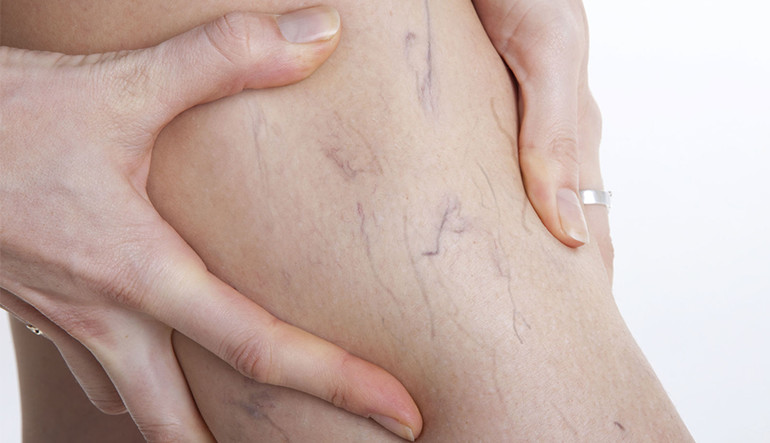What Kind of Doctor Treats Varicose Veins in Legs?
In the past, varicose veins could only be treated by vascular surgeons because surgery was the only treatment option available. However, in recent years, there have been massive developments in vein care and modern technology, because of which varicose vein treatments are now minimally invasive and non surgical.
Vein doctors, officially known as phlebologists, can come from various fields of medicine. They may be medicine doctors, cardiologists, vascular surgeons, hospitalists, anesthesiologists, or any other doctor. The only necessity is that the vein doctor should have the proper training in vein care.

If you have varicose veins in legs, it’s extremely important to seek treatment immediately. Varicose veins may seem like a surface cosmetic issue, but they’re actually very dangerous because they’re caused by underlying venous insufficiency. This is a condition in which your vein valves malfunction and blood accumulates in your leg veins.
If you don’t treat varicose veins promptly, they can lead to issues like blood clots in your veins, leg ulcers, skin discoloration, swollen ankles and feet, and profuse bleeding from your vein. That’s why you should find a vein doctor immediately.
As previously mentioned, vein doctors can come from various fields of medicine. So you should be focused on their qualifications, track record, and degree of specialization. In this article, we’ll discuss what are some of the qualities of the best vein doctors.
Qualities of the Best Vascular Surgeon
Advancements in vein care and modern technologies have greatly simplified vein treatments. Instead of complicated and risky surgeries, varicose veins can now be treated with minimally invasive and non-surgical procedures that generally conclude within an hour and have a negligible risk of side effects.
However, the easy access and simplicity of vein treatment also means the market is full of ill-experienced vein doctors. If you don’t go to the right vein doctor, you increase your risk of complications. There’s also a risk that the doctor will only treat the surface symptoms without addressing the underlying venous insufficiency, which means your varicose veins will simply return.
The following are some qualities you need to look out for when looking for the best vein doctors.
Board Certification
Board certification isn’t a necessity to become a vein doctor, but it does help the experienced and highly-qualified vein doctors stand out from the crowd. In order to get certified, the vein doctor has to complete their residencies, fellowships, and accrue a high degree of specialization in vein care. This serves as a guarantee that the vein doctor is highly qualified and skilled at their work.
Minimally Invasive Varicose Vein Treatments
Some vascular surgeons still recommend surgeries for varicose veins even though they require you to be hospitalized and they carry a high risk of side effects and complications. You should only go for vein doctors who favor minimally invasive varicose vein treatments like radiofrequency ablation, endovenous laser ablation, and venaseal. If a vein doctor suggests procedures like vein ligation or venous bypass surgery, you should move on.
Patience and Compassion
The vein doctor should be extremely patient and compassionate. They should take the time to carefully explain the steps of the procedure so you’re physically and mentally comfortable during the procedure. The vein doctor should also take the time to discuss your medical history and family history. This will allow them to better determine which vein treatment is most suitable for your specific needs, thus minimizing the risk of side effects or allergic reactions.
Top Varicose Vein Treatments
If you’re suffering fro varicose veins, you should go for one of the following minimally invasive and non-surgical varicose vein treatments.
Radiofrequency Ablation
Radiofrequency ablation is a procedure in which thermal energy is used to irritate and collapse the affected saphenous vein. Once the problematic vein is closed, the accumulated blood reroutes to healthier veins and proper blood circulation is restored. This treats venous insufficiency and varicose veins.
Endovenous Laser Treatment
Endovenous laser treatment is a procedure in which laser energy — channeled through a catheter and laser fiber — is used to collapse the diseased saphenous vein. This procedure also treats venous insufficiency with a minimal risk of side effects, but it causes more post-procedural discomfort than radiofrequency ablation.
VenaSeal
VenaSeal is a procedure in which a medical adhesive is injected into your problematic saphenous vein to fuse its walls and reroute the accumulated blood to healthier veins. This is an extremely new procedure that’s only recently been approved by the FDA. As such, even though it’s extremely effective and completely safe, it’s not yet covered by insurance.
Ambulatory Phlebectomy
Ambulatory Phlebectomy is a procedure in which incisions are created on the surface of your skin and the vein doctor physically removes your superficial varicose veins. This procedure only removes the superficial veins and doesn’t treat the underlying venous insufficiency. That’s why this procedure is usually done to remove the remaining varicose veins after the primary treatment. It’s considered to be a cosmetic procedure and isn’t covered by insurance.
Treated Varicose Veins in an Hour!
At VIP Medical Group, we have some of the world’s most qualified board-certified and Ivy League-educated vein doctors who specialize in the latest varicose vein treatments. As previously mentioned, varicose veins are indicative of a dangerous underlying condition so you should seek treatment immediately. For more information, please schedule your varicose vein treatment today.

